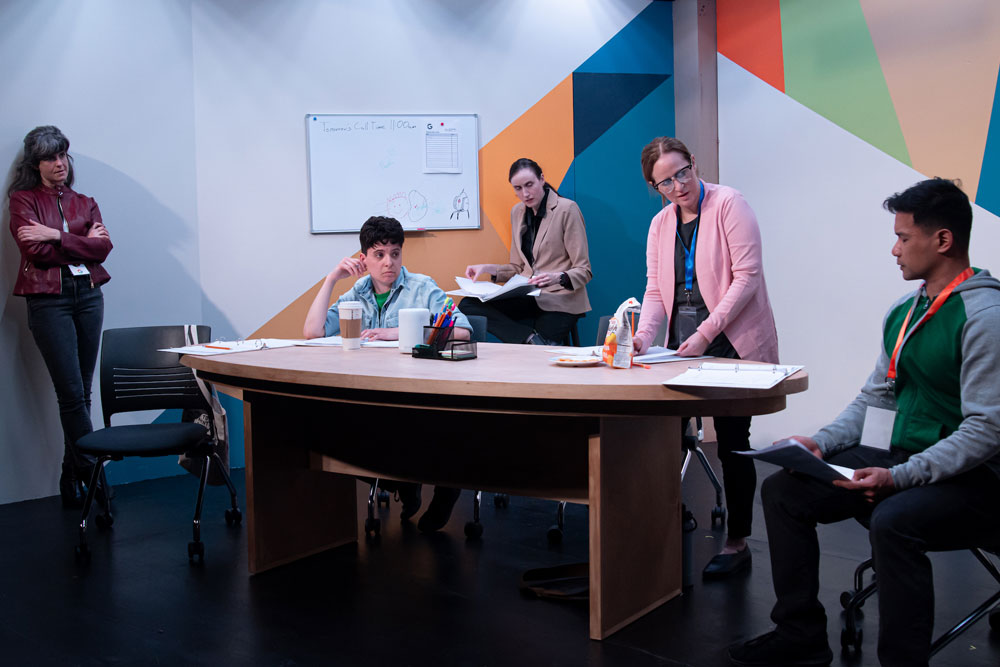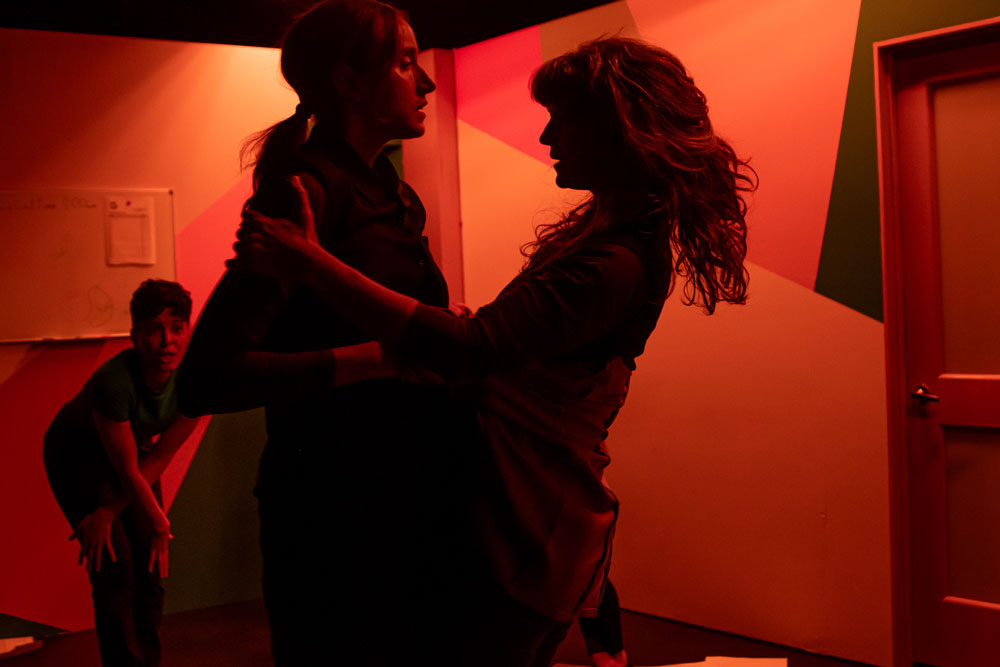
The monumental strike that brought Hollywood to a standstill for much of the latter part of last year stayed front of mind during The Singularity Play now running at Jackalope Theatre in Berger Park. In that strike, the Writers Guild of America (WGA) and the Screen Actors Guild – American Federation of Television and Radio Artists (SAG-AFTRA) came together to push back on the incursion of technology and, more specifically, artificial intelligence into the entertainment industry. Like millions of workers across occupations around the world; actors, writers and other creatives view artificial intelligence as a calamitous threat to their livelihoods and careers. Many of the concessions they procured through the work stoppage have been hailed as meaningful safeguards that will mitigate those concerns.
A dark-comedy, The Singularity Play looks at artificial intelligence in the arts from a different less hopeful lens, one in which technology has not only been wholly absorbed into the creative process; it dominates the artistic sanctum. Here, it’s called, Denise (Anelga Hajjar), and is the program that’s written the script a group of actors are going over during their table read. Spirited and opinionated, the humans are an unusually argumentative bunch and one, Alice (Lucy Carapetyan), seems particularly displeased at the wording in another actor’s, Jason’s (Kroydell Galima), lines. She’s not only offended by word usage, but she’s also nettled at the fact that the speech was generated by a robot or machine. In this case, Denise has a handler, Greg (Patrick Newson Jr.), who can alter her programming and have the algorithm modify a character’s lines. The debate whether to do so or not leads to lengthy philosophical discourses on matters of gender and artistic appropriation. Although pertinent, the arguments the characters raise have a tendency to be overextended; impeding the story’s flow and dulling its clarity. If we had a better idea of the intent or nature of the play they were preparing to perform, we might be able to make our own judgment about the strength of their positions. And although the viewpoints of other characters in the play attempted to fill this void, they didn’t sufficiently compensate for that absence of context.

The difficulty in detecting the production’s direction and in establishing a connection with the characters made the transition from one reality to another perplexing. Characters maintained similar roles, but now carried different identities. In their new iteration, each individual has a new name and has been enhanced with something referred to as wet-ware, a process that makes them part human and part machine, cyborgs. Some consider themselves still primarily human, others embrace their duality. What’s obvious but goes unspoken is their loss of autonomy. Because their brains are linked to artificial systems, aberrant thoughts, as well as behavior, can be checked and controlled.
A manufactured intelligence still overshadows the action. Now though, rather than being referred to as Denise, it goes by Dennis, also played by Hajjar, and has taken on human form. She’s joined by a cohort, Ocean (Collin Quinn Rice) who interacts more directly with the troupe. Like a designated intermediary, Ocean relays Dennis’s directives. Superficially deferential, he radiates threat.

Oddly, it’s Dennis who receives the preponderance of focus during the play’s waning minutes. Now completely sentient and inhabiting a procured human body, she has both self-awareness and self-perception; and sufficient agency to view herself as a writer.
It’s never made clear when, but during this undesignated time in the future, mankind has been remanded or removed to isolated geographical regions. Idaho, jokingly, is often referenced as one of them. When Dennis encounters Dawn, (Jennifer Jelsema), exhausted from days traveling by foot, she thinks she’s may have come from Boise. Their exchange is one of the most crucial in the production and leads to an end that’s both quietly dramatic and wholly surprising. Conducted in near whispers, much of the dialog was missed and it was necessary to rely on gestures and posture to infer a final sentiment that rests on hope.
Grappling with the fear and unanticipated consequences of the march toward the full integration of artificial intelligence into our lives is just beginning to result in artistic output like The Singularity Play. Tighter cohesion, fewer and more fully developed characters and a more defined through line may have sharpened this production’s message. The accuracy in which it portrays widespread concern about unrestrained technological advances however is indisputable.
The Singularity Play
Jackalope Theatre
Through June 22, 2024
Coach House Theater
Berger Parker Cultural Center
6205 N. Sheridan Road
Chicago, IL 60660